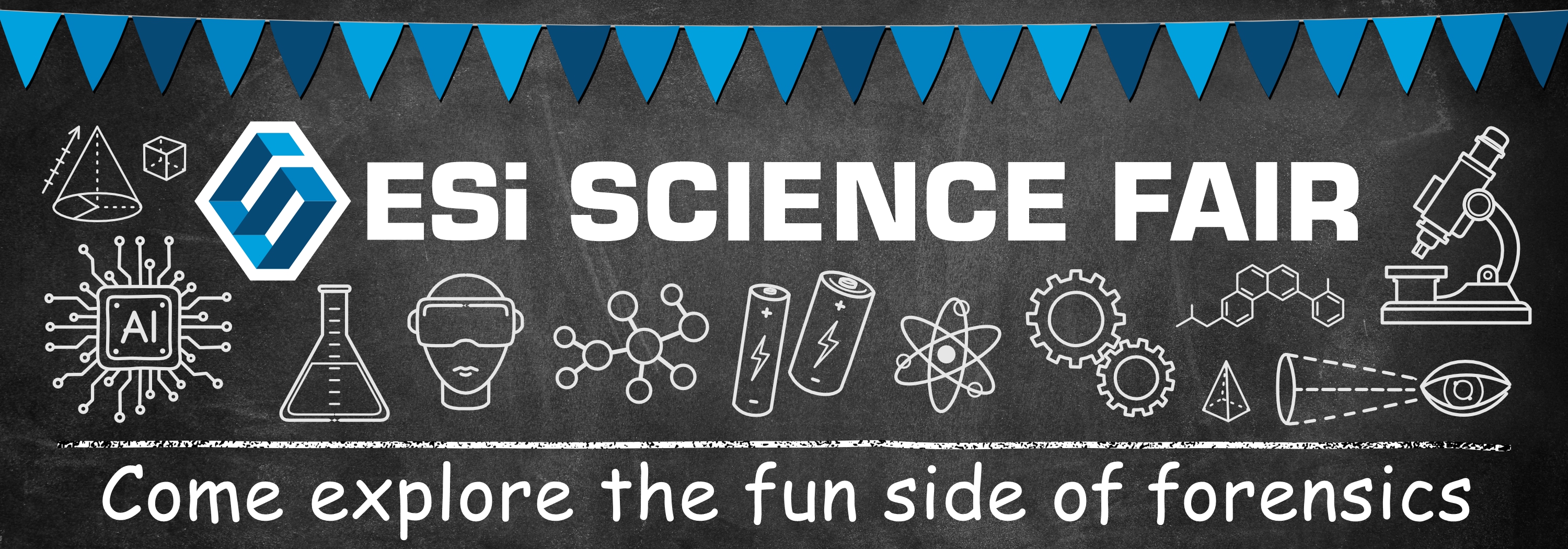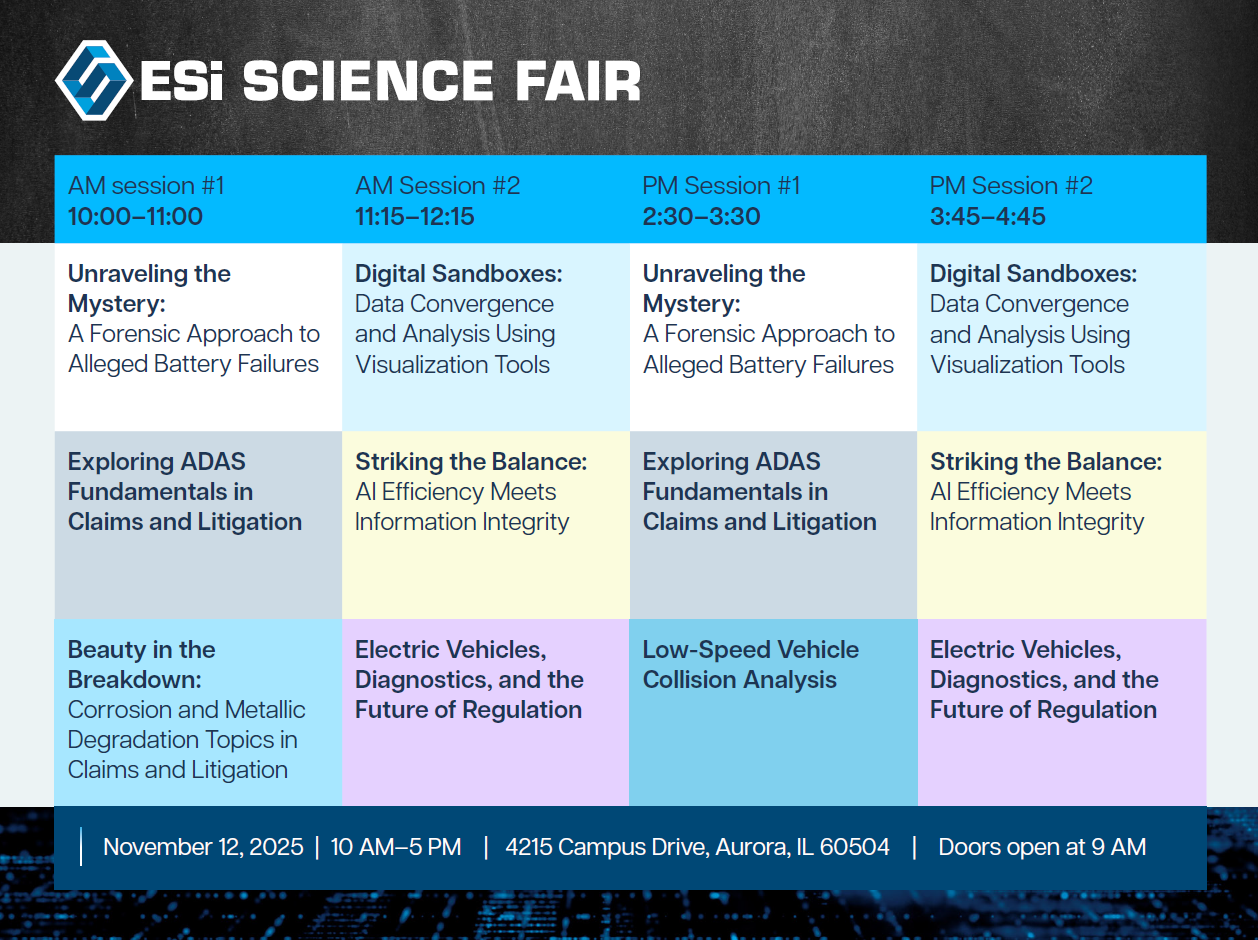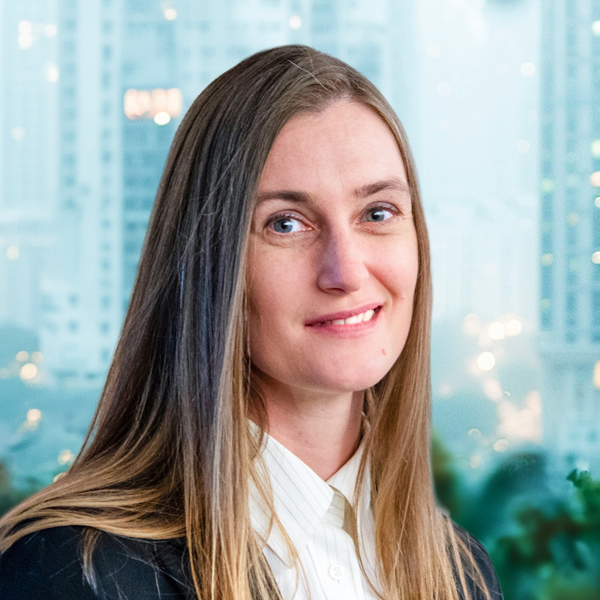
ESi is hosting our inaugural Science Fair on Wednesday, November 12th, from 10:00 a.m. – 5:00 p.m. in our Aurora facility, encompassing a behind-the-scenes look at the fun side of forensics! The day will begin and end with continuing education sessions and an interactive Science Fair in between. Doors open at 9:00 a.m., and registration will continue throughout the day. Lunch will be provided.
You’re invited to take part in any portion of the day that works best for your schedule.
Please RSVP by November 5th: RSVP here
For any questions, please contact Kristin Sherman at ksherman@engsys.com.
Please note:
Up to four hours of CLE credit is approved in IL and WI.
Up to four hours of insurance adjuster CE credit is approved in DE, FL, GA, IN, LA, NH (multi-line), NC, OK, TX, and WY.
Interactive Demonstrations
Chemistry
See how chemistry goes beyond the lab and into the real world. This live demo will highlight how data is captured and analyzed in the field to solve complex challenges.
Electricity
Electricity may seem mysterious, but our demonstration will bring clarity to how it works. Attendees will experience interactive experiments that make this invisible force both understandable and exciting.
Safety
Discover how the scientific method is applied to ensure safety in everyday tools, machines, and structures. Our safety demonstrations will showcase real-world testing and analysis that help prevent failures and protect people.
Structures
Explore how engineers evaluate the safety and durability of buildings and infrastructure. These demos will showcase advanced tools and techniques used to model, test, and strengthen structural integrity.
Tools & Methods
Investigators today have access to more powerful tools than ever before. Our team will highlight cutting-edge resources, from modern digital libraries and precision measurement systems to advanced battery testing, imaging, and materials characterization.
Vehicles
Explore multiple demonstrations to see how experts use visualization and analysis tools to reconstruct accidents, including those involving ADAS-equipped vehicles.

Educational Sessions: CE & CLEs
Striking the Balance: AI Efficiency Meets Information Integrity
This course equips participants to identify both the benefits and challenges of integrating artificial intelligence (AI) into the workplace and professional workflows. It provides an introduction to key concepts such as information integrity, copyright considerations, and source verification. Through an exploration of agentic patterns, participants will learn how to assess, validate, and appropriately include—or exclude—AI-generated content in their work. Participants will also develop strategies for inclusive, organization-wide evaluation of AI tools and learn how to implement best practices aligned with industry standards and regulatory requirements. Real-world examples of workflow improvements and information integrity failures will be examined to help participants apply course concepts effectively in their own professional environments.
Presented by:
- Joseph Riddle, Director, Senior Managing Consultant
- Catherine Yanikoski, Research Librarian
Unraveling the Mystery: A Forensic Approach to Alleged Battery Failures
In this presentation, participants will learn about how alleged battery failures are investigated and key points related to battery safety. A review of batteries including a general overview as well as safety structures and risk factors will be provided. The presentation then delves into the forensic investigation of battery failures, from first steps to root cause. It covers information collection, laboratory analysis, and electrical testing that provide insight into the failure and help prevent another from occurring. Also discussed is the importance of understanding the quality of obtained batteries and how to independently evaluate a battery for performance and safety.
Presented by:
- Tal Nagourney, Senior Consultant
- Brian May, Staff Consultant
Digital Sandboxes: Data Convergence and Analysis Using Visualization Tools
This course will help the participant understand the various visualization tools that can be used, not just for demonstrative visual exhibits, but for engineering and accident investigation analysis that leads to meaningful contributions to the issues in a particular matter. The participant will learn how 3-dimensional data is captured and turned into a digital model, and through examples, they will see how various visual analysis techniques can create unique case insights and increased awareness of the relationship between various factors in an accident.
Presented by:
- Erick Knox, Chief Technical Officer
- Lance Rewerts, Senior Consultant
Exploring ADAS Fundamentals in Claims and Litigation
This 60-minute seminar will present the latest in technology of ADAS, or Advanced Driver Assist Systems that uses a combination of technologies to monitor the vehicle’s surroundings and either alert the driver or take action to mitigate accidents. Additional topics will include what’s common on the road today, enabling technologies and their effectiveness, levels of autonomy, human factors including driver fallback and misuse, standards, and risks associated with collision repair.
Presented by:
- Amar Awale, Senior Staff Consultant
- Noel Manuel, Senior Consultant
Electric Vehicles, Diagnostics, and the Future of Regulation
This course will help the participant understand electric vehicle terminology and how diagnostic trouble codes provide important data for failure analysis. Diagnostic theory and regulatory history will provide context for the current state of data reporting in present electric vehicle technology. The discussion around the present state of data reporting will lead to an explanation of near future regulatory changes.
Presented by:
- Hernán Mercado-Corujo, Senior Director, Principal
Beauty in the Breakdown: Corrosion and Metallic Degradation Topics in Claims and Litigation
This course will help the participant understand information that can be gleaned from corrosion and degradation of metallic surfaces. An introduction to various corrosion mechanisms along with relevant codes and standard of care issues will be presented. Case studies included highlight the application and utility of corrosion knowledge in claims and litigation scenarios.
Presented by:
- Megen Maginot, Senior Consultant
Low-Speed Vehicle Collision Analysis
This presentation is designed to provide an overview of a multidisciplinary approach, involving accident reconstruction and biomechanics, used to analyze low-speed vehicle collisions. It will explore how physical evidence and peer-reviewed methodologies are used to quantify and evaluate the severity of low-speed motor vehicle accidents. Using real-world case studies, attendees will navigate how accident reconstruction and biomechanics can be used together to investigate whether a claimed injury is consistent with the subject accident.
Presented by:
- Hana Chan, Staff Consultant
- Nicholas Civitanova, Senior Staff Consultant






















